Answering the Top Toughest B1 B2 Visa Interview Questions (with Sample Answers)
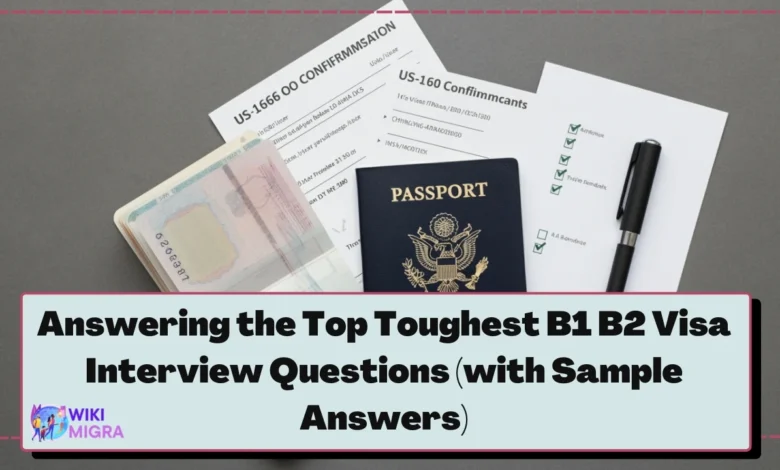
Feeling the pre-interview jitters for your US B1/B2 visa? You’re not alone. Walking into the US Embassy or Consulate for your nonimmigrant visa interview can feel daunting. The questions seem unpredictable, and the stakes feel high. What exactly are they looking for? What specific B1 B2 Visa Interview Questions will they ask? How should you answer?
Relax. You’ve come to the right place.
As a specialist in ‘Prep & Settle,’ focusing on navigating complex processes like visa applications, I’ve guided countless individuals through this stage. This guide is built on extensive research and practical experience. We’ll break down everything you need to know:
- Why the interview exists and what consular officers really want to determine.
- The key categories of US visa interview questions you can expect, with numerous examples for both B1 (Business) and B2 (Tourism/Medical/Visit) visas.
- Proven strategies for answering effectively and honestly.
- A comprehensive checklist for preparing your documents and yourself.
- Common mistakes to avoid.
- What happens after the interview.
My goal is to equip you with the knowledge and confidence to navigate your interview successfully. This isn’t just about listing potential B1 B2 Visa Interview Questions; it’s about understanding the context behind them and presenting yourself authentically. Let’s dive in and turn that anxiety into preparedness.
Understanding the Purpose of the B1/B2 Visa Interview

Before we get into the specific questions, let’s understand the why. The entire B1/B2 visa interview boils down to one fundamental principle mandated by U.S. immigration law (specifically Section 214(b) of the Immigration and Nationality Act):
The consular officer must presume you intend to immigrate unless you prove otherwise.
Your job during the interview is to overcome this presumption by demonstrating nonimmigrant intent. This means convincing the officer that:
- Your trip has a legitimate, temporary purpose: You have clear, credible reasons for visiting the US (business, tourism, visiting family, medical treatment) that align with the B1 or B2 visa category.
- Your stay will be temporary: You have specific plans for your visit duration and intend to leave the US at the end of your authorized stay.
- You have strong ties to your home country: This is arguably the most crucial element. You need to show compelling reasons – economic, social, familial – that will ensure your return home after your temporary visit.
- You have sufficient funds: You can finance your trip (and potential medical costs, if applicable) without resorting to unauthorized employment or becoming reliant on US public resources (a “public charge”).
Every question the consular officer asks is designed to assess one or more of these points. Understanding this core objective helps you frame your answers more effectively. They aren’t trying to trick you; they are fulfilling a legal requirement to assess your intent based on your situation and answers.
Key Categories of B1/B2 Interview Questions (with Explanations & Sample Questions)
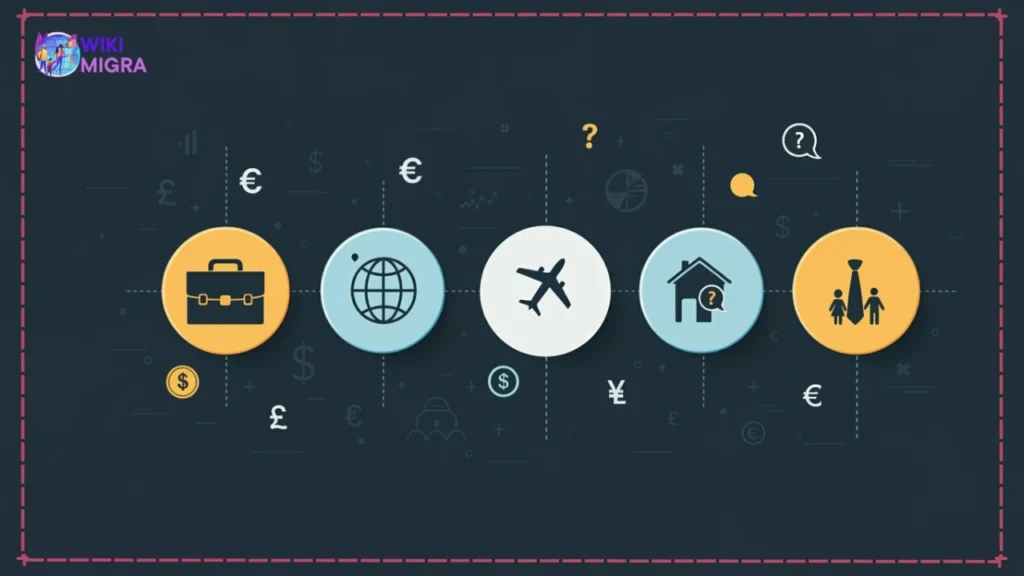
Consular officers typically structure their questioning around several key themes. While the exact phrasing and follow-up questions will vary based on your individual circumstances and the officer’s assessment, most B1 B2 Visa Interview Questions fall into these categories.
Questions About Your Trip Purpose (B1/B2 Specifics)
Explanation: This is fundamental. The officer needs to understand exactly why you want to go to the United States and confirm that your intended activities fall within the scope of a B1 (Business) or B2 (Tourism, Visit, Medical) visa. Vague or inconsistent answers here raise immediate red flags. Be clear, concise, and specific.
Sample Questions:
- Why do you wish to travel to the United States? (Be specific – “To attend the XYZ tech conference in Las Vegas,” “To visit my sister in Chicago for three weeks,” “For a two-week vacation visiting national parks in California,” “For a consultation with Dr. Smith at the Mayo Clinic.”)
- What is the primary purpose of your visit?
- Are you traveling for business (B1) or pleasure/visit/medical (B2)?
- How long do you intend to stay in the US? (Be specific and ensure it aligns with your stated purpose and DS-160 form).
- What dates do you plan to travel?
- Where exactly will you be visiting in the US? (List cities, states, specific locations like hotels, conference venues, family addresses).
- Do you have a travel itinerary? May I see it? (Especially important for complex tourist trips or business visits).
- Have you booked your flight tickets? (Not mandatory, but can show planning).
- Where will you be staying? (Hotel name, family member’s address).
- Why do you want to visit now?
- What tourist attractions do you plan to visit? (For B2 Tourist)
- Who are you visiting in the US? (For B2 Visit)
- What is your relationship with this person?
- How long have you known them?
- What is their immigration status in the US? (Citizen, Green Card holder, student, etc.)
- Where do they live and work?
- Can I see the invitation letter from them?
- What specific business activities will you undertake? (For B1 Business)
- Who are you meeting with? (Company names, individuals’ titles).
- What is the nature of the meetings/conference/training?
- Why is your physical presence required? Why can’t this business be conducted online or via phone?
- Can I see the invitation letter from the US company or conference registration?
- Will you be receiving any payment from a US source for your activities? (Generally not allowed on B1, except for limited expense reimbursements).
Questions About Your Ties to Your Home Country
Explanation: This is the absolute cornerstone of proving nonimmigrant intent. Consular officers are trained to look for strong, compelling reasons demonstrating that you will return home after your temporary visit. Weak ties suggest a higher risk of overstaying. Think about everything that roots you to your home country. This is where proving ties to home country visa interview becomes critical.
Sample Questions:
- Employment:
- What is your current job? What company do you work for?
- What is your specific role/position/title?
- What are your responsibilities?
- How long have you been employed at this company?
- What is your monthly or annual salary? (Be prepared to show payslips/employment letter).
- Have you been approved for leave for this trip? May I see the leave approval letter?
- What are your career plans in your home country?
- Are you self-employed? Tell me about your business. (Show business registration, tax documents).
- Family:
- Are you married?
- Will your spouse travel with you? If not, why not? What does your spouse do?
- Do you have children? How many? What are their ages?
- Will your children travel with you? If not, why not? Who will care for them while you are away?
- Do you have parents or other close family members (siblings, grandparents) in your home country?
- Do you support your family members financially or act as a caregiver?
- Property & Assets:
- Do you own a house or apartment in your home country? (Be ready to show deed/ownership documents).
- Do you own land or other significant property?
- Do you have significant investments or savings in your home country?
- Studies (If applicable):
- Are you currently a student?
- What are you studying? Which university/institution?
- What year are you in? When do you expect to graduate?
- What are your plans after graduation?
- Why do you need to travel during your studies? Have you received permission from your university?
- Social & Other Ties:
- Do you have significant social commitments or roles in your community? (Volunteer work, memberships in organizations).
- Do you have future plans in your home country that require your return (e.g., job offer, starting a business, planned marriage)?
Questions About Your Financial Situation & Funding for the Trip
Explanation: The officer needs assurance that you can afford your trip without engaging in unauthorized work in the US and that you won’t become a public charge (dependent on government assistance). Be prepared to demonstrate financial capacity clearly.
Sample Questions:
- Who is paying for your trip? (Yourself, your employer, a family member?)
- What is your approximate annual income? (Should align with employment details).
- How much money do you have available for this trip?
- Can you show proof of funds? May I see your bank statements? (Bring recent, original statements showing a consistent income and sufficient balance).
- What is the estimated total cost of your trip? (Include flights, accommodation, food, activities, potential medical costs). How did you arrive at this estimate?
- How will you access your money in the US? (Credit cards, debit cards, cash).
- If your employer is paying (for B1):
- Can I see the letter from your employer confirming they are covering the costs?
- If someone else (sponsor) is paying (e.g., family member for B2):
- Who is this person? What is your relationship with them?
- Why are they paying for your trip?
- What is their financial status? What do they do for work?
- Can I see their bank statements and a letter of support/sponsorship affidavit (Form I-134, although not always strictly required for B visas, can be helpful)?
- What is their immigration status in the US (if they reside there)?
Questions About Your Travel History
Explanation: Your past travel behavior provides insight into your respect for immigration laws. A history of traveling internationally and returning home as planned strengthens your case. Conversely, previous visa denials, overstays, or immigration violations anywhere in the world will require careful and honest explanation.
Sample Questions:
- Have you ever traveled outside your home country before?
- Which countries have you visited? When did you travel? How long did you stay?
- Have you ever been to the United States before?
- If yes, when was your last visit?
- What type of visa did you travel on?
- How long did you stay during that visit? Did you comply with the authorized stay duration?
- What was the purpose of that visit?
- Have you ever applied for a US visa before?
- If yes, when and where did you apply?
- Was the visa approved or denied?
- If denied, what was the reason given for the denial? (Be honest – they have records. Explain the circumstances and what has changed since then).
- Have you ever been denied entry to the US at a port of entry? If yes, explain.
- Have you ever overstayed a visa in any country, including the US? (Honesty is crucial. Explain the circumstances if applicable).
- Have you ever been deported or removed from any country?
Questions About Your Companions (If Applicable)
Explanation: If you’re not traveling alone, the officer will want to know who you are traveling with and understand their situation as well, as it can sometimes relate to your own intent.
Sample Questions:
- Are you traveling alone or with someone?
- Who are you traveling with? (Name, relationship – spouse, child, friend, colleague).
- What is the purpose of their travel? (Is it the same as yours?)
- Do they already have a US visa? If yes, what type?
- Are they applying for a visa with you today?
- How long have you known the person you are traveling with (if not immediate family)?
Specific Questions for B1 (Business) Applicants
Explanation: While many questions overlap, B1 applicants face scrutiny regarding the legitimacy and nature of their business activities. The officer needs to be sure it’s genuine short-term business and not disguised employment. Business visa interview questions focus here.
Sample Questions (Beyond general purpose):
- Tell me more about your company in [Your Home Country]. What does it do? What is its size?
- What is your specific role in the business deal or conference?
- Can you describe the US company you are visiting? What is their business?
- How did you establish contact with this US company?
- What specific projects or negotiations will you be involved in?
- Why is it necessary for you specifically to travel for this?
- How will this trip benefit your company back home?
- Can I see your business card?
- Do you have product samples or brochures (if relevant)?
- Are you planning to attend any training? What kind? (Ensure it’s brief, specialized training not constituting full-time study or work).
Specific Questions for B2 (Medical Treatment) Applicants
Explanation: Applicants seeking entry for medical treatment need to demonstrate clear arrangements, proof of the medical necessity for US treatment, and the financial ability to cover all associated costs without burdening the US healthcare system.
Sample Questions:
- What specific medical condition requires treatment in the US?
- Why can’t you receive this treatment in your home country? What makes the US treatment necessary or superior?
- Which doctor or hospital will be providing the treatment?
- Do you have an appointment letter from the US doctor/hospital? May I see it?
- Do you have a letter from your local doctor explaining the condition and recommending treatment in the US?
- How long is the proposed treatment expected to take?
- What is the estimated cost of the medical treatment, including doctor fees, hospital stays, and related expenses?
- How will you pay for the medical costs? (Show proof of funds, insurance coverage if applicable, or sponsor documentation specifically covering medical bills).
- Where will you stay during the treatment and recovery period?
How to Prepare for Your B1/B2 Visa Interview: Beyond the Questions
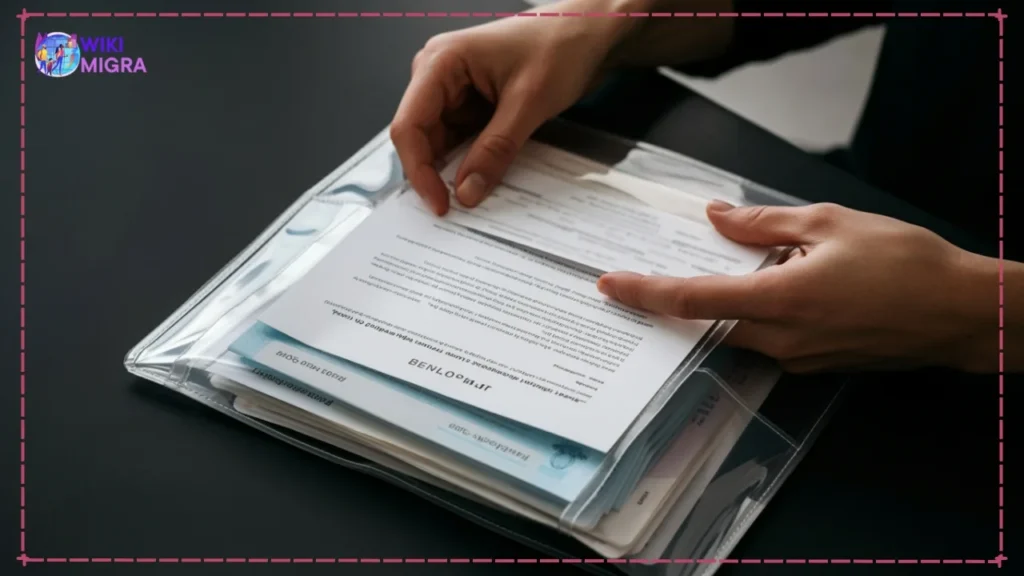
Knowing the potential B1 B2 Visa Interview Questions is only half the battle. Effective preparation is key to presenting your case clearly and confidently.
Essential Documents Checklist
Gathering and organizing your documents is crucial. While requirements can vary slightly by embassy/consulate, here’s a general list. Bring originals and copies where possible. Only provide documents when asked by the officer.
Mandatory Documents:
- Passport: Valid for at least six months beyond your intended period of stay in the US. Must have at least one blank page.
- DS-160 Confirmation Page: The barcode page printed after submitting your online nonimmigrant visa application.
- Visa Interview Appointment Letter: Confirmation of your scheduled interview.
- Visa Fee Payment Receipt: Proof you paid the required MRV fee.
- Photograph: One recent color photograph (within the last six months) meeting US visa photo requirements (usually 2×2 inches or 5×5 cm), even if uploaded with DS-160. Check specific embassy guidelines.
Supporting Documents (Bring those relevant to YOUR situation):
- Proof of Ties to Home Country:
- Employment: Employment verification letter (stating position, salary, length of employment, approved leave), recent payslips, business registration/tax documents (if self-employed).
- Financial: Recent bank statements (showing regular income and sufficient funds), fixed deposit receipts, property deeds (house, land), investment documents.
- Family: Marriage certificate, birth certificates of children, photos (use judiciously).
- Studies: Student ID card, letter from school confirming enrollment and approved absence.
- Trip Purpose Documentation:
- B1 (Business): Letter of invitation from US company, conference registration confirmation, letter from your employer detailing trip purpose and financial coverage, business correspondence.
- B2 (Tourism): Travel itinerary, hotel reservations (optional but helpful), tour bookings.
- B2 (Visit): Invitation letter from US host (family/friend), copy of host’s status documents (passport bio page, visa, Green Card), proof of relationship (photos, correspondence).
- B2 (Medical): Letter from local physician, appointment letter from US physician/hospital, documents detailing medical condition and treatment plan, proof of funds specifically for medical costs.
- Financial Sponsorship (If applicable):
- Letter of support from sponsor, sponsor’s bank statements, sponsor’s employment letter, sponsor’s proof of US status, potentially Affidavit of Support (Form I-134, check necessity).
- Travel History: Old passports containing previous visas and entry/exit stamps.
Organizing Your Documents
Don’t just stuff everything into a bag. Organize your documents logically in a folder or file. Use tabs or clips to separate categories (e.g., Personal, Financial, Employment, Trip Purpose). This allows you to quickly find and present a document if the consular officer asks for it. Fumbling through a messy pile creates a poor impression and wastes valuable interview time.
Practicing Your Answers (But Be Honest!)
Think about how to answer B1 B2 visa questions clearly and concisely. Practice articulating your reasons for travel, your ties, and your financial situation out loud. However, DO NOT MEMORIZE SCRIPTED ANSWERS. Officers are trained to detect rehearsed responses, which can seem suspicious.
- Focus on Clarity: Be direct and to the point.
- Focus on Conciseness: Avoid long, rambling stories. Answer the question asked.
- Focus on Truthfulness: Honesty is paramount. Discrepancies between your answers, your DS-160 form, and your documents can lead to denial.
Rehearse explaining your situation naturally, not reciting memorized lines. Think about the core message you need to convey for each category.
Dressing Appropriately
While there’s no strict dress code, aim for a neat, clean, and professional or smart-casual appearance. Business attire (a suit or formal wear) is appropriate for B1 applicants. For B2, clean, modest, and presentable clothing is best. Avoid flashy jewelry, strong perfumes, or overly casual attire (like ripped jeans or T-shirts with slogans). First impressions matter.
Mental Preparation: Be Confident and Calm
Interviews can be stressful, but try to remain calm and composed. You’ve prepared, you know your situation, and you have legitimate reasons for wanting to visit. Take deep breaths before entering. Project confidence (but not arrogance). Remember, the officer is just doing their job.
Tips for Answering Questions Effectively During the Interview
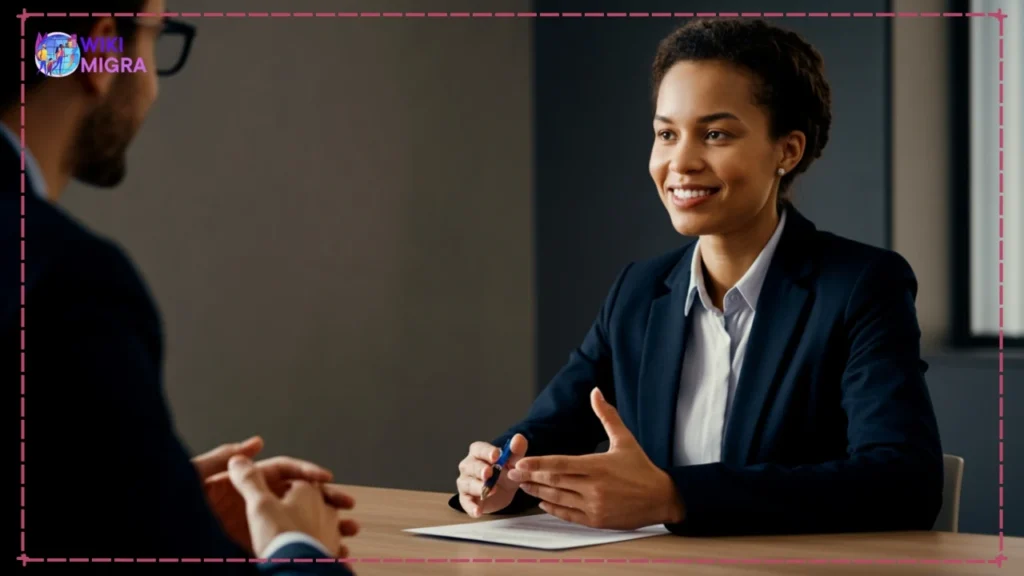
How you interact with the consular officer is as important as what you say. Follow these visa interview tips:
- Be Honest and Truthful: This cannot be overstated. Lies or misrepresentations, even small ones, can lead to visa denial and potentially a permanent bar from entering the US. They have access to extensive databases.
- Listen Carefully to the Question: Make sure you understand what the officer is asking before you respond. Don’t interrupt.
- Answer Clearly and Concisely: Get straight to the point. Avoid providing excessive information that wasn’t requested, as it can sometimes open up unnecessary lines of questioning. If a ‘yes’ or ‘no’ answer suffices, provide it, then add a brief explanation if needed.
- Provide Supporting Documents ONLY When Asked: Have your organized documents ready, but don’t hand over anything unless the officer specifically requests it.
- Maintain Eye Contact and Be Polite: Engage with the officer respectfully. Address them as “Officer.” Good manners go a long way.
- If You Don’t Understand, Ask for Clarification: It’s better to ask “Could you please repeat the question?” or “I’m sorry, I didn’t quite understand” than to guess and answer incorrectly. If there’s a language barrier, politely inquire if interpretation assistance is available (though interviews are typically conducted in English or the local language).
- Stay Calm, Even if Challenged: The officer might ask probing or direct questions to test your consistency or resolve. Don’t become defensive or argumentative. Answer calmly and factually.
Common Mistakes to Avoid During the B1/B2 Interview
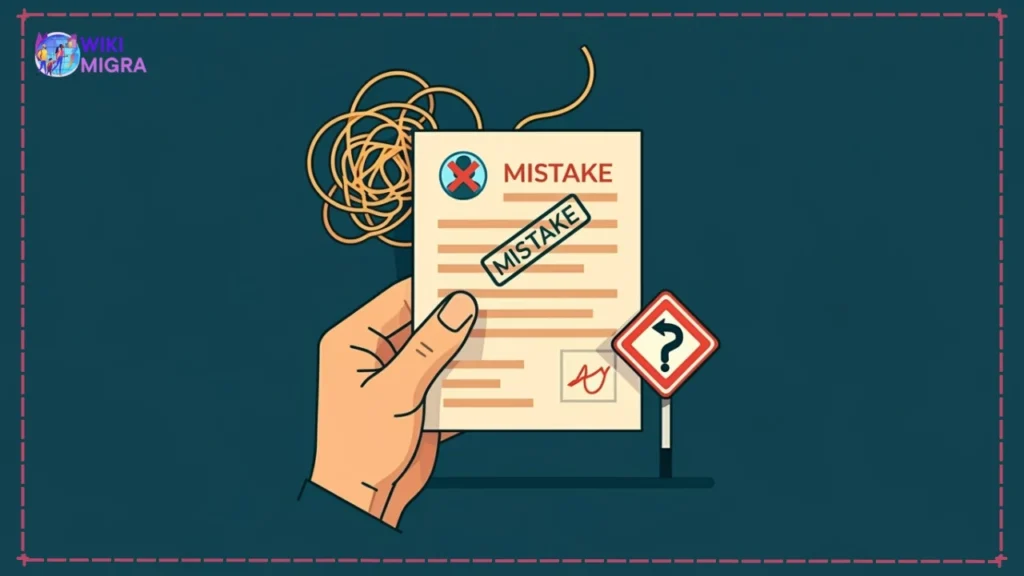
Many applicants undermine their own cases by making avoidable errors:
- Being Dishonest or Providing Fake Documents: An immediate recipe for denial and potentially severe long-term consequences.
- Memorized/Robotic Answers: Raises suspicion that you’re hiding something or haven’t thought through your plans genuinely.
- Vague Answers about Trip Purpose or Funding: Creates doubt about your intentions and financial stability. Be specific!
- Appearing Desperate or Argumentative: Suggests you might have reasons not to return home or that you don’t respect the process.
- Not Having Necessary Supporting Documents Ready: Shows poor preparation and makes it hard for the officer to verify your claims.
- Failing to Demonstrate Strong Ties to Home Country: If you can’t articulate compelling reasons to return, the officer is legally obligated to assume immigrant intent. Focus heavily on preparing this aspect.
- Giving Too Much Unsolicited Information: Can lead the interview down irrelevant paths or raise new concerns.
- Inconsistencies: Ensure your verbal answers match your DS-160 application and supporting documents.
What Happens After the Interview?
Once the officer has finished asking questions, they will make a decision. The possible outcomes are:
- Approval: The officer will typically keep your passport to place the visa inside. They will inform you of the approval and explain how your passport will be returned (usually via courier service within a few days to weeks). Congratulations!
- Denial (Refusal): The officer will return your passport immediately and usually provide a letter explaining the reason for the refusal. The most common reason for B1/B2 denials is under Section 214(b), meaning you failed to convince the officer of your nonimmigrant intent (usually due to perceived weak ties).
- Administrative Processing (AP / 221(g)): The officer needs more information or requires additional background checks before making a final decision. They will return your passport and provide a letter (often a 221(g) letter) explaining what is needed or that your case requires further processing. This can take weeks or even months. You might need to submit additional documents or wait for checks to clear.
Frequently Asked Questions (FAQ) about B1/B2 Interviews
(Note: For website implementation, use Schema.org FAQPage markup for this section)
- Q1: What questions are asked in B1 B2 visa interview?
- A1: Questions typically cover your trip purpose (why travel, duration, destination), ties to your home country (job, family, property), financial situation (funding the trip), travel history (previous travel, visa denials), and companions. Specific questions depend on whether you apply for B1 (business) or B2 (tourism, visit, medical). See the detailed categories above for numerous examples.
- Q2: Can I bring my family member into the interview room?
- A2: Generally, no. Only applicants are allowed into the interview area. Exceptions are typically made for minor children (parents accompany them) or applicants who require physical assistance. Check the specific embassy/consulate guidelines.
- Q3: How long does the B1/B2 visa interview usually take?
- A3: The actual face-to-face interview with the consular officer is often surprisingly brief, typically lasting only 2-5 minutes. However, expect to spend several hours at the embassy/consulate due to security checks, fingerprinting, and waiting times.
- Q4: What if I am refused a visa? Can I reapply?
- A4: Yes, if your visa is refused (most commonly under section 214(b)), you can reapply in the future. However, you should only do so if your circumstances have significantly changed or if you have substantial new evidence to address the reasons for the previous denial. Simply reapplying immediately with the same information is unlikely to yield a different result. You will need to submit a new application and pay the fee again.
- Q5: Do I need an immigration lawyer for a B1/B2 visa interview?
- A5: For most standard B1/B2 applications, an immigration lawyer is not necessary. The process is designed for applicants to represent themselves. However, if your case is complex (e.g., previous immigration violations, multiple denials, unusual circumstances), consulting with an experienced immigration lawyer might be beneficial. They cannot attend the interview with you but can help prepare your application and documentation.
- Q6: How to answer B1 B2 visa questions successfully?
- A6: Answer honestly, clearly, and concisely. Listen carefully to the question asked. Focus on demonstrating your specific, temporary purpose for visiting and your strong ties to your home country that ensure your return. Have supporting documents ready if requested. Stay calm and polite.
Conclusion: Your Path to a Successful Interview
Navigating the B1 B2 Visa Interview Questions successfully hinges on thorough preparation, unwavering honesty, and clearly demonstrating your nonimmigrant intent. Remember the consular officer’s primary goal: to ascertain that you have a legitimate reason for your temporary visit and strong ties compelling your return home.
By understanding the why behind the questions, organizing your documents meticulously, practicing your responses (without memorizing!), and presenting yourself calmly and confidently, you significantly increase your chances of approval. Focus on showcasing your stable life in your home country – your job, family, property, and future plans there.
This ultimate guide provides the framework and insights, but your unique story and documentation bring it to life. You’ve got this! Prepare well, be truthful, and approach the interview with confidence.
We wish you the very best of luck with your B1/B2 visa interview!
Call to Action (CTA):
- Have you been through the B1/B2 interview? Share your experience or tips in the comments below! Your insights could help fellow applicants.
- Found this guide helpful? Please share it with friends, family, or colleagues preparing for their US visa interview.
- Looking for more detailed information? Check out our other resources:





